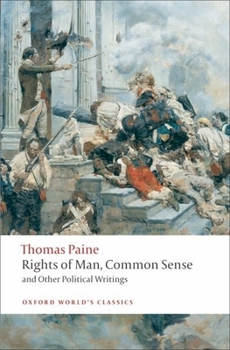Rights of Man, Common Sense and Other Political Writings
Thomas Paine was the first international revolutionary. His Common Sense (1776) was the most widely read pamphlet of the American Revolution--and his Rights of Man (1791-2), the most famous defense of the French Revolution, sent out a clarion call for revolution throughout the world. Paine paid the price for his principles: he was outlawed in Britain, narrowly escaped execution in France, and was vilified as an atheist and a Jacobin on his return to America.
This new edition contains the complete texts of both Rights of Man and Common Sense, as well as six other powerfully political writings--American Crisis I, American Crisis XIII, Agrarian Justice, Letter to Jefferson, Letter Addressed to the Addressers on the Late Proclamation, and Dissertation on the First Principles of Government--all of which illustrate why Paine's ideas still resonate in the modern welfare states of today. About the Series: For over 100 years Oxford World's Classics has made available the broadest spectrum of literature from around the globe. Each affordable volume reflects Oxford's commitment to scholarship, providing the most accurate text plus a wealth of other valuable features, including expert introductions by leading authorities, voluminous notes to clarify the text, up-to-date bibliographies for further study, and much more.
This new edition contains the complete texts of both Rights of Man and Common Sense, as well as six other powerfully political writings--American Crisis I, American Crisis XIII, Agrarian Justice, Letter to Jefferson, Letter Addressed to the Addressers on the Late Proclamation, and Dissertation on the First Principles of Government--all of which illustrate why Paine's ideas still resonate in the modern welfare states of today. About the Series: For over 100 years Oxford World's Classics has made available the broadest spectrum of literature from around the globe. Each affordable volume reflects Oxford's commitment to scholarship, providing the most accurate text plus a wealth of other valuable features, including expert introductions by leading authorities, voluminous notes to clarify the text, up-to-date bibliographies for further study, and much more.
Format:Paperback
Language:English
ISBN:019953800X
ISBN13:9780199538003
Release Date:January 2009
Publisher:Oxford University Press
Length:544 Pages
Weight:0.86 lbs.
Dimensions:1.1" x 5.0" x 7.7"
Customer Reviews
1 rating
We have it in our power to begin the world over again
Published by Thriftbooks.com User , 17 years ago
This was a required reading for a graduate humanities class. John Keane's biography succinctly showed that Tom Paine (1737-1809) was the consummate revolutionary and a daring adventurer. Not only was he an important figure in the American Revolution, but he also traveled to France in 1791 to give that revolution a push. Paine traveled from England, just in time to stoke the flames of the revolution with his pamphlet Common Sense, in January 1776. To call Common Sense a sensation in the colonies is actually a bit of an understatement. It was an unparallel sensation and monumental work of Enlightenment rhetoric that quickly fanned the flames of rebellion throughout the colonies. In four months, over 120,000 copies were printed in the colonies--over 500,000 copies by years end. No other pamphlet printed in seventeenth century America came close to its success. Most importantly, Common Sense served to get the colonial patriots to drop their fear of open rebellion, and also emboldened those delegates who favored declaring independence from Britain. The delegates now had the confidence that a large segment of the colonists would support rebellion. Similar to the Declaration of Independence, the philosophical ideas in Common Sense are primarily from the English philosopher, John Locke (1632-1704). The most moving quote from the pamphlet became quite prophetic, when one considers the impact it ultimately had on the delegates in the congress, the drafting of the Declaration of Independence, and on the world. "We have it in our power to begin the world over again." As a graduate student in philosophy and history, I heartily recommend this timeless classic to anyone who is interested in political philosophy, and history.





